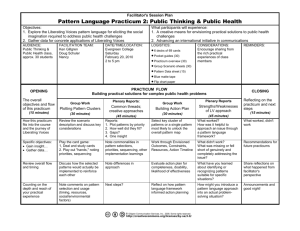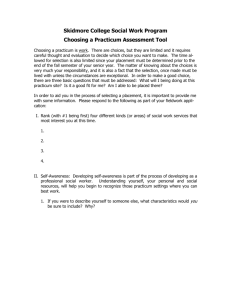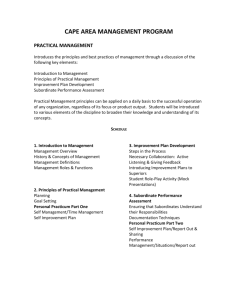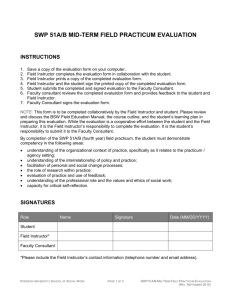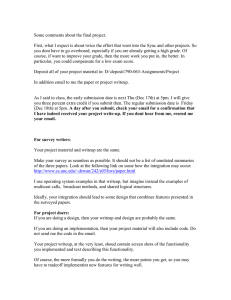Communication-Intensive Course
advertisement
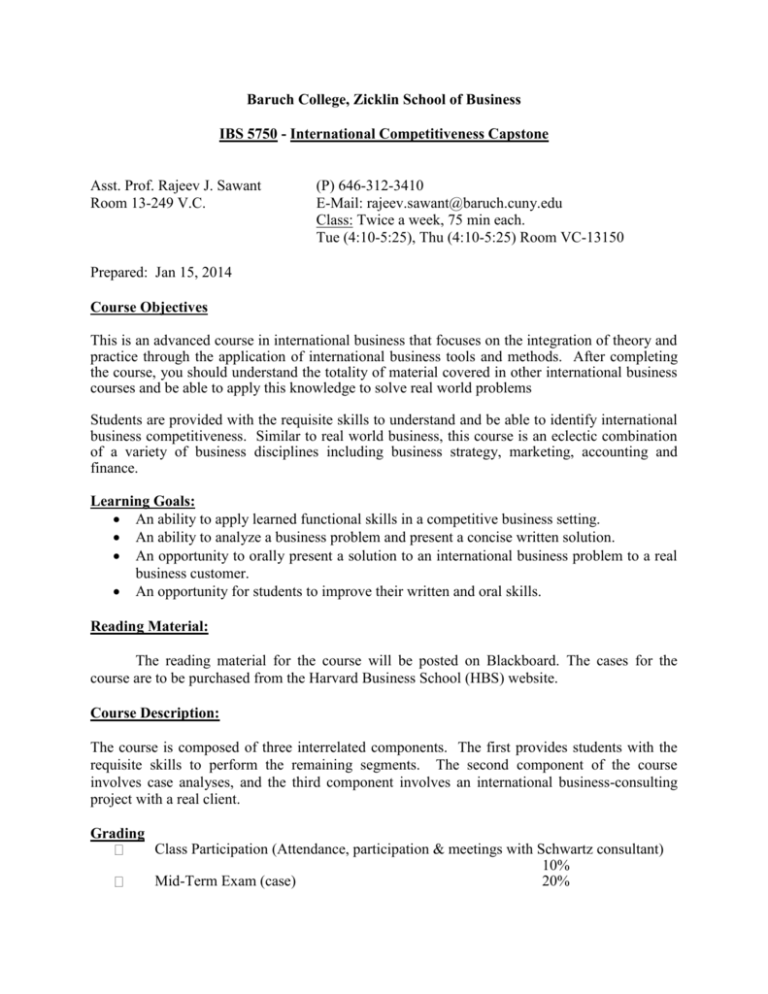
Baruch College, Zicklin School of Business IBS 5750 - International Competitiveness Capstone Asst. Prof. Rajeev J. Sawant Room 13-249 V.C. (P) 646-312-3410 E-Mail: rajeev.sawant@baruch.cuny.edu Class: Twice a week, 75 min each. Tue (4:10-5:25), Thu (4:10-5:25) Room VC-13150 Prepared: Jan 15, 2014 Course Objectives This is an advanced course in international business that focuses on the integration of theory and practice through the application of international business tools and methods. After completing the course, you should understand the totality of material covered in other international business courses and be able to apply this knowledge to solve real world problems Students are provided with the requisite skills to understand and be able to identify international business competitiveness. Similar to real world business, this course is an eclectic combination of a variety of business disciplines including business strategy, marketing, accounting and finance. Learning Goals: An ability to apply learned functional skills in a competitive business setting. An ability to analyze a business problem and present a concise written solution. An opportunity to orally present a solution to an international business problem to a real business customer. An opportunity for students to improve their written and oral skills. Reading Material: The reading material for the course will be posted on Blackboard. The cases for the course are to be purchased from the Harvard Business School (HBS) website. Course Description: The course is composed of three interrelated components. The first provides students with the requisite skills to perform the remaining segments. The second component of the course involves case analyses, and the third component involves an international business-consulting project with a real client. Grading Class Participation (Attendance, participation & meetings with Schwartz consultant) 10% Mid-Term Exam (case) 20% Case analysis (3 cases) Practicum Presentation (Client, Instructor and Schwartz consultant) Paper Total 20% 50% 40% 10% 100% Class Participation: The class is conducted using the Socratic method of teaching which consists of a question answer format. This is a great opportunity for you to learn to communicate clearly, think on your feet and learn to participate as part of a group in a safe environment where there are no wrong answers. This ability will stand you in good stead as you prepare to enter the job market. Mid Term Exam: A mid-term exam will be a case analysis covering course material. The exam will be closed book, but you are allowed one page (one side) of notes. The case will be distributed a week before the exam; however, exam questions will not be provided in advance of the exam. Case Analysis: You are required to perform a written analysis of 3 cases listed in the course syllabus of your choosing. Case assignments are due prior to their discussion in the class. The case analysis is a group project done by the same group as the practicum project. You can think of these assignments as warm-ups for the practicum. You are required to hand in a one page executive summary and an additional page of charts, graphs or any other material that supports your analysis and solution in the executive summary. Practicum/Group Project: The focus on the practicum part of the course involves integrating theory and practice through the application of international business tools and methods. You will form teams of five to seven people. I will assign a ‘client’ to each team. The clients are companies from the New York region with a real world business problem. The main output is a business solution for the problem for your target company. As part of the plan, students will research the problem, analyze the data and brainstorm creative solutions for their company. This involves problem analysis, gathering data through the library, research, and field research through the client firms. Students will present their recommendations to the company. The presentation will involve every member of the team and each individual’s presentation will count towards class participation as well as the overall group grade. Students will also present a written report to the client outlining their research, approach for solving the problem and their solution. Communication-Intensive Course This class is a communication intensive course that will emphasize the following BBA Learning Goals: analytical skills, oral and written communication. Since this is a communicationintensive class, an expert from the Schwartz Center has been assigned to assist you. You should regard this as an important opportunity to improve your communication skills, written, oral and presentation, prior to your entering the job market. You are required to meet with the consultant for your case writeups, your project analysis and the project presentation as outlined below. These are important learning goals and count towards your class attendance and participation. a) The consultant will review your case write-up assignments and improve your written and analytical skills on a group basis. b) The consultant will meet with the project groups to work on your project structure and layout as you research and analyze your cases. c) The consultant will also meet with the project groups to work on presentation skills prior to the formal class presentation. By participating in the course, you should experience a little of the real world and obtain practical knowledge and tools that will help you succeed in the global marketplace once you have graduated. Code of Conduct Academic dishonesty includes, but is not limited to cheating, plagiarism, collusion, sabotage, and falsification of records. For clarification and definitions see College’s Academic Honesty Website: www.baruch.cuny.edu/academic/academic_honesty.html. Penalties can be severe and are determined by the instructor on a case-by-case basis. Syllabus Class Date Topic Covered Reading 1 28-Jan Overview Syllabus 2 30-Jan Accounting Overview Accounting Framework, Financial Statements, and Some Accounting Concepts. Background Note. William J. Burns Jr. Harvard Business School Publishing. 3 4-Feb Strategy Overview What is your strategy? Background Note. Xavier Gilbert. Harvard Business School Publishing. Case 4 5 6-Feb Marketing Framework 11- Developing an Feb Overall Assessment Framework 1. Note on Marketing Strategy. Robert Dolan. Harvard Business School Publishing. 2. Managing Global Expansion: A Conceptual Framework, Note. 3. Writing Great Marketing Plans, Note 1. SWOT Analysis I: Looking Outside for Threats and Opportunities, Note. 2. SWOT Analysis II: Looking Inside for Strengths and Weaknesses, Note. 3. Some Thoughts on Business Plans. HBS Note 897101. 4. Ethics a Basic Framework, HBS Note 307059. 5. Avoiding Integrity Land Mines, Harvard Business Review, 2007 6 13- Case Analysis Feb 7 18- Case Analysis Feb Case writeup due. 8 25- Case Analysis Feb Case writeup due. Case writeup due. Harrington Collection: Sizing up the Active-Wear Market Crocs: Revolutionizing an Industry’s Supply Chain for Competitive Advantage, Case Nantucket Nectars 9 27- Case Analysis Feb Case writeup due. Chemdex Arbitrage: Exploiting Differences. Ghemawat, P. 2007 10 4-Mar Case Analysis Case writeup due. Tata Consulting Services - Iberoamerica. Building global champions in Latin America. By: Haberer, Pablo R., Kohan, Adrian F., McKinsey Quarterly, 00475394, 2007 Special Edition 11 6-Mar Case Analysis Case writeup due. 12 11- Case Analysis Mar Case writeup due. 13 13- Case Analysis Mar Case writeup due. 14 18- International Mar Business Research 15 20- Midterm Exam Mar (Case based) 16 25- Teams Mar assigned companies, meet with the company, and meet to discuss practicum and obtain teacher feedback. Discussion midterm exam case. 17 27- Teams meet Mar during class time to work on practicum 1. Teams meet with clients Wal-mart Stores: Everyday Low Prices in China. Zara: Fast fashion Wanxiang Group: A Chinese company’s global strategy Louise Klusek from library staff will present approaches to International Business Research To be distributed 18 1-Apr Teams meet during class time to work on practicum 1. Teams meet with clients 19 3-Apr Teams meet during class time to work on practicum 8-Apr Teams meet during class time to work on practicum and obtain teacher feedback. 10- Teams meet Apr during class time to work on practicum and obtain teacher feedback. 1. Teams meet with clients. 20 21 1. Team presentation to Schwartz consultant 2. Team presentation to instructor 3. Team presentation to Schwartz consultant 4. Team presentation to instructor 22 24- Teams meet Apr during class time to work on practicum and obtain teacher feedback. 23 29- Student Group Apr Business Plan Presentations Client Presentation 24 1-May Student Group Business Plan Presentations Client Presentation 25 6-May Student Group Business Plan Presentations Client Presentation 26 8-May Student Group Business Plan Presentations Client Presentation 27 13- Student Group May Business Plan Presentations Client Presentation 5. Team presentation to Schwartz consultant 6. Team presentation to instructor 28 15- Course Wrap May up



